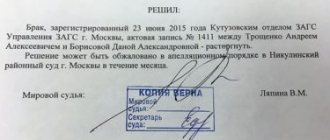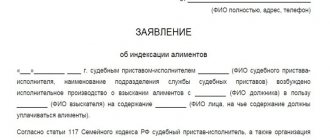1. The court decision is made immediately after the hearing of the case. The court must announce the operative part of the decision at the same court session in which the trial of the case ended. The announced operative part of the court decision must be signed by all judges and attached to the case.
2. Drawing up a reasoned court decision may be postponed for a period of no more than five days from the date of completion of the trial of the case.
3. The magistrate may not draw up a reasoned court decision on the case considered by him.
4. The magistrate is obliged to draw up a reasoned court decision on the case considered by him if the persons participating in the case or their representatives submit an application for drawing up a reasoned court decision, which can be submitted: 1) within three days from the date of announcement of the operative part of the court decision if the persons participating in the case and their representatives were present at the court hearing; 2) within fifteen days from the date of announcement of the operative part of the court decision, if the persons participating in the case and their representatives were not present at the court hearing.
5. The magistrate draws up a reasoned court decision within five days from the date of receipt of an application from the persons participating in the case and their representatives to draw up a reasoned court decision.
6. A court decision in a case considered in summary proceedings is drawn up taking into account the features provided for in Article 232.4 of this Code. (Part additionally included from June 1, 2021 by Federal Law of March 2, 2021 N 45-FZ) (Article as amended, entered into force on April 4, 2013 by Federal Law of March 4, 2013 N 20-FZ.
Commentary on Article 199 of the Code of Civil Procedure of the Russian Federation
1. Due to one of the principles of the institution of judicial proceedings - continuity (Part 3 of Article 157 of the Code of Civil Procedure of the Russian Federation) - the court decision is made immediately after the hearing of the case, which is confirmed by the operative part of the decision itself, which the justice body is obliged to announce at the last meeting. This part is signed by the judge (judges) and attached to the materials of the civil case.
2. At the same time, the legislator allows the preparation of a reasoned decision to be delayed for up to five days. The resolution of this issue - whether to postpone the preparation of a reasoned decision or to make a decision in final form immediately after the hearing of the case - is left to the discretion of the court.
3. The general rule on drawing up reasoned court decisions has one exception, namely, magistrates have the right to limit themselves to making a decision without a reasoning part in the case considered. However, such a legislative approach may cause criticism in connection with existing international legal standards in the field of fair trial in civil cases. In particular, the ECtHR Ruling of 21.01.1999 “Garcia Ruiz v. Spain” states: “The Court recalls that, in accordance with its constant practice, reflecting the principle associated with the good administration of justice, judicial decisions must indicate sufficiently the motives on which they are based. The scope of this duty may vary depending on the nature of the decision and must be considered in the context of the circumstances of each case. Moreover, if clause 1 of Art. 6 obliges the courts to give reasons for their decisions, it cannot be interpreted as requiring a detailed answer to each argument (argument).”
4. The magistrate’s obligation to draw up a reasoned decision arises only if the persons participating in the case or their representatives submit a corresponding application. The latter can be filed within 3 or 15 days from the date of announcement of the operative part of the decision, depending on the personal presence or non-presence of the specified subjects of civil procedural legal relations at the last court hearing. However, one must take into account the rule of Art. 214 of the Code of Civil Procedure of the Russian Federation, according to which copies of the court decision are sent to persons participating in the case, but not present at the court hearing, no later than five days later. Hence, taking into account territorial and other objective factors, there is a danger that interested parties will miss the 15-day deadline for filing an application for drawing up a reasoned court decision.
5. When a magistrate receives an application from persons participating in the case or their representatives to draw up a reasoned court decision, such a decision must be drawn up within five days. Therefore, it is reasonable to submit an application addressed to the magistrate in person or send it by post with acknowledgment of receipt in order to know exactly on what specific day the decision will lose its interim procedural form. This is especially important from the point of view of counting the period provided for an appeal (Part 2 of Article 321 of the Code of Civil Procedure of the Russian Federation), which, as a result of legislative innovations in Art. 199 of the Code of Civil Procedure of the Russian Federation increases a priori significantly on a calendar basis. Violation by the court of the deadline for preparing a reasoned decision is grounds for reinstating the procedural deadline for filing an appeal (see, for example, Determination of the Leningrad Regional Court dated January 16, 2013 N 33-219/2013).
Commentary on Article 194 of the Code of Civil Procedure of the Russian Federation
1. When adopting a final decision that resolves the case on its merits, the court analyzes the evidence examined at the court hearing, evaluates it and, on the basis of this, draws conclusions about the factual circumstances relevant to the case, the nature of the disputed legal relations and their legal qualifications, as well as whether the claim can be satisfied. This procedural activity of the court as a body of state (judicial) power administering justice in civil cases is reflected in a written act called a decision. It is always accepted in the name of the Russian Federation, even if the case was resolved on the merits by a magistrate, who is a judge of general jurisdiction of the relevant constituent entity of the Russian Federation (Part 2 of Article 1 of the Federal Law of December 17, 1998 “On Magistrates in the Russian Federation”).
_______________ Northwestern Russian Federation. 1998. N 51. Art. 6270.
2. A prerequisite for the legality of a decision is the fulfillment of the requirements for its adoption in the deliberation room while maintaining secrecy. This is one of the guarantees of the implementation of the principle of independence of judges in the administration of justice and their subordination only to the Constitution of the Russian Federation and federal law.
Only judges who are members of the court during a collegial hearing of a case, or one judge if he is considering the case alone, can be in the deliberation room. Violation of the secrecy of the deliberation room when making a decision is an unconditional basis for the cancellation of a decision by a higher court.
The requirement for secrecy of the deliberation room is aimed at ensuring the independence of judges; it also implies a ban on the disclosure of information about the judgments expressed by judges during the deliberation. However, the mere disclosure of such information after the resolution of the case does not constitute grounds for canceling the decision, since this violation could not affect the will of the judges during the meeting on the issues discussed.
3. In a collegial hearing of a case, the judges of a given composition of the court have equal powers when making a decision. They resolve all issues discussed during the meeting by majority vote.
One of the guarantees of ensuring the equality of all judges when making a decision is the rule that imposes on the presiding officer the obligation to indicate his final position on the issue being resolved and to vote last. Otherwise, it could affect the outcome of the resolution of the case due to the greater authority of the presiding officer. This does not prevent the possibility of conducting a discussion on the issues discussed when making a decision, during which all judges, including the presiding judge, have the right to defend their own point of view, citing appropriate arguments in support of it.
4. When making a decision, all judges are obliged to form and indicate their personal position on the issues being resolved; none of the judges has the right to abstain from voting. If left in the minority, the judge has the right to express a dissenting opinion in writing, which is attached to the case materials.
Consultations and comments from lawyers on Article 194 of the Code of Civil Procedure of the Russian Federation
If you still have questions regarding Article 194 of the Code of Civil Procedure of the Russian Federation and you want to be sure of the relevance of the information provided, you can consult the lawyers of our website.
possible by phone or on the website. Initial consultations are held free of charge from 9:00 to 21:00 daily Moscow time. Questions received between 21:00 and 9:00 will be processed the next day.
Article 194. Adoption of a court decision
1. The decision of the court of first instance, which resolves the case on its merits, is adopted in the name of the Russian Federation in the form of a court decision.
2. The court decision is made in a deliberation room, where only the judge considering the case or the judges who are members of the court in the case can be present. The presence of other persons in the deliberation room is not permitted.
3. The meeting of judges takes place in the manner prescribed by Article 15 of this Code. Judges cannot disclose opinions expressed during the meeting.
Information about changes:
Federal Law No. 272-FZ of October 21, 2013 supplemented Article 194 of this Code with Part 4
4. A judge who has a dissenting opinion on a decision has the right to express a dissenting opinion in writing within no more than five days from the date of the court’s decision. When expressing his dissenting opinion, the judge does not have the right to indicate in it information about the judgments that took place during the discussion and decision-making, about the position of individual judges who were members of the court, or in any other way reveal the secret of the meeting of judges. The judge's dissenting opinion is attached to the decision made.
Another comment on Art. 199 Civil Procedure Code of the Russian Federation
The commented article establishes a general rule regarding the deadline for drawing up a court decision in final form, i.e. all its parts - introductory, descriptive, motivational and operative. It must be drawn up immediately after the end of the proceedings.
However, when resolving a specific case, the court has the right to postpone the preparation of a reasoned decision for a period of no more than five days from the date of completion of the trial of the case and the announcement of the operative part of the decision. This five-day period begins to run from the moment the operative part of the decision is announced, which follows immediately after the trial and the removal of the judges to the deliberation room to make a decision.
The announced operative part of the decision must be signed by all judges who participated in the court session and made the decision, and attached to the case materials.
Article 199 of the Code of Civil Procedure of the Russian Federation. Drawing up a court decision (current version)
1. According to the commented article, having considered the case on its merits, the court at the same court session makes a final decision. Postponement of drawing up a reasoned decision for a period of no more than five days is possible only in exceptional cases. After the announcement of the introductory and operative parts of the decision, the court announces when the persons participating in the case, as well as their representatives, can familiarize themselves with the reasoned decision. This date is recorded in the minutes of the court hearing.
2. Part 3 art. 157 of the Code of Civil Procedure of the Russian Federation establishes that the court hearing in each case takes place continuously, with the exception of the time designated for rest. Until the end of the consideration of the initiated case or until the adjournment of its proceedings, the court has no right to consider other civil, criminal and administrative cases. One of the types of rest time according to Art. 107 of the Labor Code of the Russian Federation are weekends. Meanwhile, this provision concerns the trial itself and cannot apply to the making of a decision, since when making a decision the secrecy of the deliberation room must be respected (Article 194 of the Code of Civil Procedure of the Russian Federation). When the court is removed to the deliberation room, for example, on Friday evening, the provisions of the commented article should be applied, which establishes that the court’s decision is made immediately after the hearing of the case. In this case, the preparation of a reasoned court decision may be postponed for a period of no more than five days from the date of completion of the trial of the case, but the operative part of the decision must be announced by the court at the same court session in which the trial of the case ended.
Thus, if the court is removed to the deliberation room on Friday evening, the decision in the case cannot be announced on Monday morning. The judge has no right to leave the deliberation room, since this would violate the secrecy of the deliberation room. If it is impossible to draw up a reasoned decision on Friday evening, the court must announce the operative part of the decision on the same day.
3. The Supreme Court of the Russian Federation draws the attention of courts to the need to strictly adhere to the deadline established by the article commented on for drawing up a reasoned decision.
4. A reasoned decision is drawn up by the presiding judge or one of the judges and signed by all the judges who considered the case.
5. The introductory and operative parts of the drafted reasoned decision must correspond verbatim to the introductory and operative parts of the decision announced on the day the trial of the case ended. The date of the reasoned decision is indicated, as in the announced operative part, the day of completion of the trial of the case (Article 193 of the Code of Civil Procedure of the Russian Federation). Both the announced operative part of the decision and the decision drawn up in final form are attached to the case. The period for filing an appeal or submission against a decision in final form is calculated from the next day after the day appointed by the court for familiarization with the reasoned decision.
6. On the procedure for calculating procedural deadlines, see the contents and commentary to Art. Art. 107, 108 Code of Civil Procedure of the Russian Federation.
7. See also commentary to Art. Art. 213, 261 Code of Civil Procedure of the Russian Federation.









